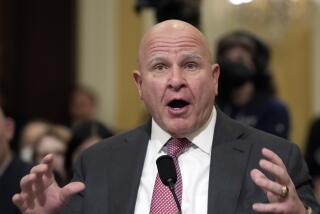Ex-White House Spokesmen Fault Clinton for Lies
Two former White House press secretaries told a gathering of newspaper editors Friday that had they been working for President Clinton, they would have resigned by now.
Speaking at a conference of more than 250 journalism executives, former Ronald Reagan press secretary Larry Speakes and former Lyndon B. Johnson spokesman George Christian said they would not work for a president who had lied to them outright.
Christian and Speakes were referring to denials by President Clinton to his spokesman, Mike McCurry, and to his closest aides that he had engaged in an affair with former White House intern Monica S. Lewinsky.
McCurry reportedly wanted to depart late last year but stayed on after the scandal broke. He announced in July that he would leave, which he did early this month.
But a California political analyst who joined the White House veterans in a panel discussion on “The Presidency and the Press” said they’d be missing the boat.
“It’s a Cabinet-led government these days,” Claremont Graduate University political scientist Sherry Bebitch Jeffe told the audience at the annual Associated Press Managing Editors conference, at the Disneyland Hotel in Anaheim.
With Clinton consumed by the Lewinsky affair, “this is an unparalleled time for a Cabinet secretary and top people in the administration to really have an impact on policy,” she said. “Why leave now?”
The remarks by the press secretaries, one who worked for a Democratic president and one for a Republican, were a window into what has become one of the most tightly controlled media venues in the world. They also tended to prove that old press secretaries never stop spinning.
Christian, whose former boss’ statements about the Vietnam War generated the phrase “credibility gap,” said he only lied to the press once while working in the White House--and never about Vietnam. The lie concerned the relationship of a Supreme Court nominee to Johnson.
Speakes, who had to defend the Reagan Administration’s actions to the press during the Iran-Contra scandal, also asserted he never told a lie. Instead, he said, when reporters hurled volatile questions, he relied on a spokesman’s favorite standby.
“I had to duck,” Speakes said.
Both men waxed nostalgic about their time in the White House, years when they often were the only quotable source around, making them the center of the nation’s media world.
Christian said he had “absolute access” in the Johnson administration, starting with early-morning briefings at the president’s bedside. Speakes said the Reagan White House was a different story.
“I had to fight for access,” Speakes recalled. “I spent two to three years fighting to get a place at the table.”
But for all the questions about the panelists’ own history, the discussion kept coming back to the media’s preoccupation of the day: Monica.
“The way Clinton has hung his folks out to dry in the last few months is really unconscionable,” Christian said of Clinton’s seven-month denial of an extramarital affair with Lewinsky.
He said Clinton’s actions have created “an atmosphere of resentment in the White House” that has only hurt the president more.
Speakes said his method as press secretary had been to find out the truth when reporters asked, even if that meant playing sleuth with his colleagues in the White House.
But Speakes said there were limits.
“If you can’t get out there and defend [a president’s actions] or talk about it, then you have to make a choice,” he said. ‘You’re either going to bend your morals or resign.”
Another panelist, Washington Post reporter Kevin Merida, who covers the Clinton administration, said that the limits on reporters covering the White House foster resentment and lock out their readers from understanding how the place they cover really works.
The Starr Report, he said, “highlights the complexities of the White House that the press is missing.”
Bebitch Jeffe, the only panelist based outside Washington, had the last word and used it to remind the gathering of journalists that people have more pressing things to think about each day than White House press secretaries.
“A large majority of people don’t spend 24 hours a day watching CNN, watching MSNBC,” she said. While the press and politicians are biting their nails about how to handle the latest scandal, average citizens “are out there living their lives.”
More to Read
Sign up for Essential California
The most important California stories and recommendations in your inbox every morning.
You may occasionally receive promotional content from the Los Angeles Times.










